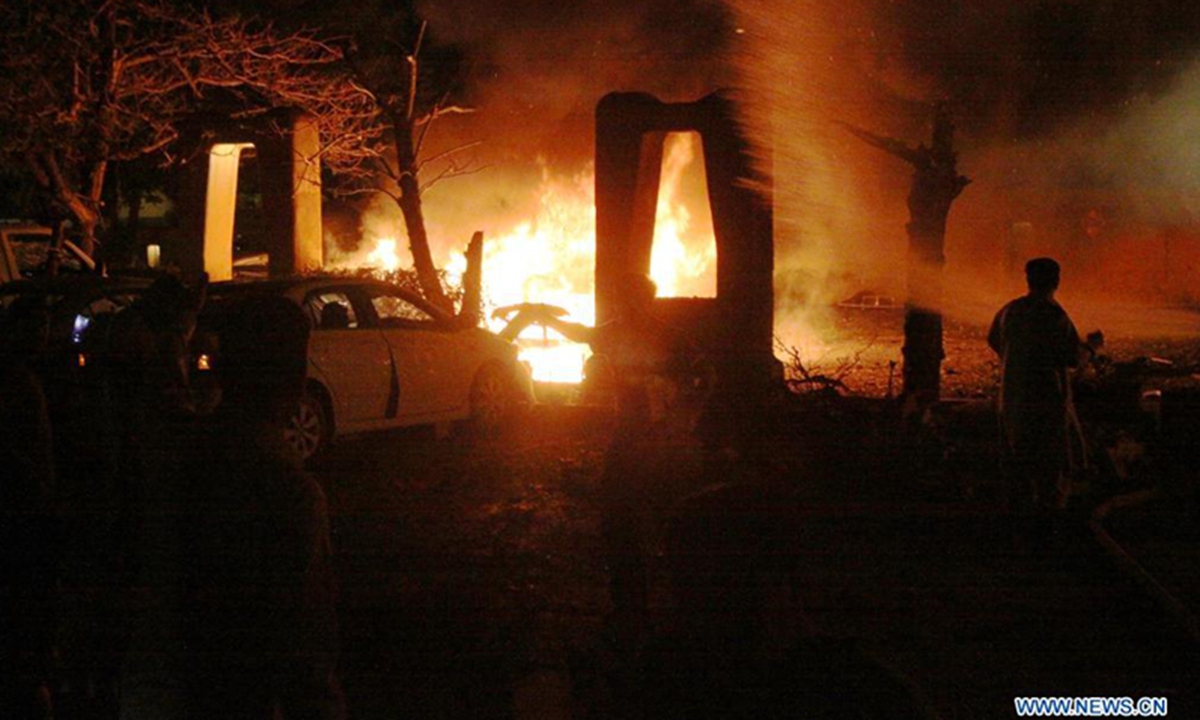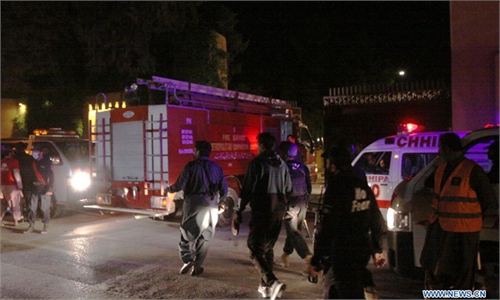Quetta blast not necessarily targeted at Chinese; Pakistan’s investment in security can ensure CPEC safety: scholar

Fire breaks out at the blast site in Quetta, Pakistan's southwest Balochistan province, on Wednesday. Three people were killed and 11 others injured when a bomb went off inside the parking area of Serena hotel in Balochistan province Wednesday night, hospital sources said. Photo: Xinhua
Editor's Note:
A deadly suicide blast took place on Wednesday at a hotel hosting the Chinese ambassador and diplomats in Quetta in southwest Pakistan. The bomb had detonated minutes before their expected return to the hotel. The Pakistani Taliban later claimed responsibility for the attack. Who was their target? As US troops are expected to completely leave Afghanistan by September 11, what security challenges does Pakistan face following the US withdrawal in terms of its relations with China, the US and Afghanistan? Global Times (GT) reporter Wang Wenwen talked to Yasir Habib Khan (Khan), founder and president of the Institute of International Relations and Media Research in Pakistan, on these issues.
GT: Who exactly were the targets of this suicide blast?
Khan: As per my perspective, it is premature to claim categorically that the attack was deliberately targeting Chinese people. It will take time to gather the pieces of clues to reach a conclusion. The reason is that the current terrorist onslaught is not the first terrorist activity in Quetta, the capital of Balochistan. Quetta has been scrambling to improve the bedevilment of their law-and-order situation by extremist groups, with the clandestine support of non-state actors, over the past many years. It is also a tangible fact that, due to security vulnerability and during successive governments, sensitive parts of the city have been cordoned off by law enforcement agencies. To me, it is a case of security breach, as, despite heightened security cover, the explosive-laden vehicle made its entry into the parking lot of the hotel and made a blast.
Besides, as far as the Taliban's statement to claim responsibility is concerned, it does not contain any information or drop the slightest hint that the attack aimed to hit Chinese people. So, this might be evidence that invalidates such brewing conceptions so far. But again, time will tell after the investigation progresses further.
GT: How would you analyze the security situation in Pakistan in recent years, especially regarding the Chinese people and Chinese projects in Pakistan? Is it worsening or improving?
Khan: Except Quetta and some parts of Balochistan, if analyzed on the whole, keeping in view the entire length and breadth of Pakistan, the security scenario is improving. According to the South Asia Terrorism Portal, Pakistan suffered 319 terrorism-related incidents in 2020 and 169 associated deaths of civilians. In comparison to these figures, nearly 4,000 such incidents took place in 2013, with over 2,700 civilian deaths.
This fall is largely due to the Pakistani army's stringent operations against the Pakistani Taliban - also known as the Tehrik-e-Taliban Pakistan (TTP) - and their causing of deaths of civilians and security forces since 2007. The severity of attacks dropped after the killing of the main leadership of the TTP, including Baitullah Mehsud in 2009, Hakimullah Mehsud in 2013, and Mullah Fazlullah in 2018. In order to undermine their foothold, the Pakistani military's Zarb-e-Azb operation began in 2014. Since 2017, having largely routed the TTP, the military's operation entered a new phase called Radd-ul-Fasaad, which literally means "elimination of all strife."
Meanwhile, sporadic incidents happened, like the terror attack on the Chinese Consulate General in Karachi and the PC hotel in Gwadar, a few yards away from the Gwadar Port, which was being administered by a Chinese company where a number of Chinese people work. Fortunately, these acts of cowardice were thwarted with no Chinese casualties or injuries.
GT: What are the motives behind the Taliban's attack? Some believe it is a warning to the US, which plans to withdraw all its troops from Afghanistan by September 11, and that the Taliban do not want to see China's presence as US media reported that China might send peacekeeping forces to Afghanistan after the US withdraws. What do you think?
Khan: From my point of view, the matter is tricky and complex. How China is going to be affected in the scenario appears to be dependent on the factors which are to be left by the US. If the withdrawal of troops is executed in a clumsy manner without tying up loose ends in the Afghan peace process, tumult is destined to spill over in every direction. And if that happens, China's boundaries are in danger.
The withdrawal may pose a threat to Afghanistan's security and stability, which could affect Xinjiang and disrupt China's counterterrorism efforts.
China has also played an anchoring role in the Afghan Peace Dialogue, with the participation of Pakistan, Iran and Russia. Many assurances have been given to the Taliban by those who facilitated the Afghan peace process.
GT: Can Pakistan ensure the safety of CPEC?
Khan: I think so far, security coverage being extended to CPEC projects seems to be up to mark with a margin of likely further improvement in terms of intelligence-sharing and deep synergic cooperation among law enforcement agencies. Facts reveal that CPEC projects are in progress in Punjab, Balochistan, KPK and Sindh. Hundreds of people (Pakistanis and Chinese) have been working there even during the night. In recent times, no incident has occurred that may raise a question mark on the safety and security scene.
During the last couple of years, Pakistan started to invest in its security sector apparatus and created several new armed units within the military and civilian police domains. To begin with, there was the creation of the new Special Security Division (SSD). The SSD consists of regular armed forces and elements of the "Civil Armed Forces" (CAF), which is a federal paramilitary force within the Ministry of Interior. Besides the Pakistan Army (PA), the Pakistani Navy (PN) has also assembled new forces for CPEC protection, such as the "Task Force-88" (TF-88) for the seaward security of the Gwadar port and protection of associated sea lanes against both traditional/conventional and nontraditional threats. The PN also raised a Coastal Security and Harbour Defence Force to tackle security threats along the coast and stationed a Force Protection Battalion (FPB, consisting of Pakistan Marines) at Gwadar for the protection of Chinese companies and workers. Furthermore, Pakistan implemented several measures to enhance its Maritime Domain Awareness (MDA), for example, through the establishment of a "Joint Maritime Information and Coordination Center" (JMICC) and "Coastal Watch Stations" (CWSs), as well as stepping up collaborative maritime security practices, not only with regional navies but especially with the People's Liberation Army Navy (PLAN). Besides the aforementioned security measures focusing mainly on Gwadar and the larger maritime component of the CPEC, the central authorities also boosted their police capacities to ensure law and order along the corridor.
GT: What security challenges does Pakistan face after the US withdrawal in terms of its relations with China, the US and Afghanistan?
Khan: It is believed that if any country is to be afflicted after the US withdrawal, it will be Pakistan, due to its strained relations with both the Afghani government and numerous Taliban groups, especially Tehrik-e-Taliban Pakistan (TTP).
In recent times, after many military operations, Pakistan uprooted TTP networks and breathed a sigh of relief. In case the TTP regains its position in the territory of Pakistan after the US leaves Afghanistan high and dry, Pakistan's security might be compromised again.
However, it is fortunate that Pakistan has almost established a deterrence in the face of expected challenges. The long Afghan border that was the root cause of terrorists' infiltration into Pakistan is now almost completely sealed by fence. Pakistan's military has completed around 90 percent of fence work around its roughly 2,600-kilometer, historically porous border with Afghanistan. The rest of the fencing is set to be completed within one or two months before the US withdrawal.
So, it is hoped that Pakistan will be well protected if any untowardness may ensue. Regarding relations with China in the upcoming scenario, there is consensus that China has stood the test of time through thick and thin. Simultaneously China also cannot afford any disability in Pakistan as any unrest may negatively impact its own security and counterterrorism measures. In terms of the US, I deem that Pakistan will continue to engage the US, because even with their withdrawal, America will continue to perpetuate its presence in various shapes to remain relevant.


